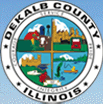 |
DeKalb County Government Official Government Website for DeKalb County, Illinois |
Minutes of the DeKalb County Regional Plan Commission
March 28, 2013
7 p.m.
DRAFT
The DeKalb County Regional Planning Commission (RPC) met on March 28, 2013 at 7:00 p.m. in the DeKalb County Administration Building, Conference Room East, in Sycamore, Illinois. In attendance were Commission members Rich Gentile, Brian Gregory, Derek Hiland, Cheryl Aldis, Tracy Jones, Liz Peerboom, Les Bellah, John Fischer, Don Pardridge, Dawn Grivetti, and Linda Swenson. Also in attendance were Dan Nolan and staff members Paul Miller and Rebecca Von Drasek.
1. Roll Call -- Commission members Bill Beverley, Martha May, Becky Morphey, and Anita Sorensen were absent.
2. Approval of Agenda -- Ms. Aldis moved to approve the agenda, seconded by Mr. Gentile, and the motion carried unanimously.
3. Approval of Minutes -- Mr. Pardridge moved to approve the minutes from October 25, 2012 and January 24, 2013, seconded by Mr. Pardridge, and the motion carried unanimously.
The Commission has also sponsored workshops and seminars on subjects of interest to entities that have land use regulation authority.
Mr. Miller asked the Commissioners what issues were currently taking place within member communities, with an eye toward sharing lessons learned from experiences and seeking input and ideas from each other. He asked what problems are currently being faced, what new projects have taken place, what new information has come to light that may be of interest or use to others.
Mr. Miller emphasized that the RPC represents a unique opportunity to share information on topics that cross governmental jurisdictions, and for members to avail themselves of the experience and expertise of others in the group.
Mr. Gregory reported that Sycamore has used transfer tax data to create a model of a development's impact.
Mr. Hiland referenced a housing study completed by the NIU Center for Government Studies as a new source of data.
Ms. Swenson observed that the intended market for a development and information such as price point would aid staff in determining the population demographics likely to live in the development.
Mr. Hiland also noted that he was requesting to update the City's Comprehensive Plan. He explained that when a developer approaches the City with a proposal that fits the Comprehensive Plan the community is hard pressed to deny the project. Mr. Hiland emphasized the importance of keeping the Comprehensive Plan current so that it reflects the values and preferences of the community.
The Committee agreed that reviewing each community's Comprehensive Plan might be a good exercise for a future meeting.
Mr. Pardridge observed that many of the communities have similar issues with development proposals.
The Commission briefly discussed as a future agenda item the topic of emergency preparedness and the need for mutual aid agreements for Public Works services. Mr. Gentile suggested cross training for key staff members. Another suggestion was file sharing so that communities' information is backed up off site in case of a disaster.
Mr. Gregory mentioned the topics such as the expiration of Annexation Agreements and of impact fee waivers might be good for the Commission to discuss.
Mr. Gentile suggested incentivizing development by designing a phased approach for the build out and the impact fees. He also suggested a discussion on how communities should move forward with unfinished development plans.
Mr. Miller thanked the Commissioners and noted that the range of suggestions would be useful for future meetings.
5. Newly Elected Official Orientation
Mr. Gentile indicated that with newly elected officials he will often take them on a tour of the public works facilities.
Ms. Aldis explained that this year staff had created a notebook to handout to newly elected officials which included contact information for key staff, information on ethics, open meeting acts, freedom of information requests and more. Mr. Gregory suggested that all elected officials have a point person on staff.
6. Municipal Development Projects / Issues Mr. Hiland noted that this topic was covered in the discussion about 2013 Agenda items.
7. Next Meeting Date -- The Commission agreed that the next RPC meeting would be on May 30, 2013 at 7:00 pm in the Conference Room East.
8. Adjournment -- Mr. Pardridge moved to adjourn, seconded by Mr. Gregory, and the motion carried unanimously.
Respectfully submitted, RGV:rgv |